“Buddhism is not so much a belief system as a path. It is more something we do than something we believe.” — Unknown
Tag Archives: Buddhism
The story we keep repeating
“(We) are impressions left by something that used to be here. We have been created, molded, formed by a bewildering matrix of contingencies that have preceded us. From the patterning of the DNA derived from our parents to the firing of the hundred billion neurons in our brains to the cultural and historical conditioning of the twentieth century to the education and upbringing given us to all the experiences we have ever had and choices we have ever made: these have conspired to configure the unique trajectory that culminates in this present moment. What is here now is the unrepeatable impression left by all of this, which we call “me.” […] What are we but the story we keep repeating, editing, censoring, and embellishing in our heads?”
— Buddhism Without Beliefs by Stephen Batchelor
Like feeling warm or cold
“Don’t try to get rid of the ego-sensation. Take it, so long as it lasts, as a feature or play of the total process — like a cloud or wave, or like feeling warm or cold, or anything else that happens of itself. Getting rid of one’s ego is the last resort of invincible egoism! It simply confirms and strengthens the reality of the feeling. But when this feeling of separateness is approached and accepted like any other sensation, it evaporates like the mirage that it is.” — Alan Watts
Still the Mind
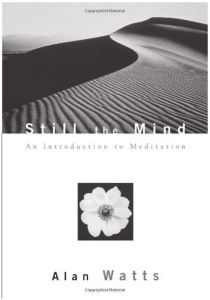 Excerpts from Alan Watts’ Still the Mind (An Introduction to Meditation)
Excerpts from Alan Watts’ Still the Mind (An Introduction to Meditation)
We fail to distinguish between the way things are and the way they are described.
One’s actual organic being is inseparable from the universe.
I found out that unless one has something to give people, there is nothing one can do to help them. Just because I thought I ought to help, it didn’t mean that I had anything to give.
The whole energy of the universe is coming at you and through you, and you are that energy.
You can only know what you can compare with something else.
What we call the past is simply the traces, the fade-outs trailing away from the present. Continue reading
The Tao of Zen
 “The Tao of Zen is a nonfiction book by Ray Grigg. The work argues that what we recognize as traditional Chinese Ch’an/Japanese Zen Buddhism is in fact almost entirely grounded in Chinese Taoist philosophy, though this fact is well shrouded by the persistence of Mahayana Buddhist institutional trappings. Utilizing an array of scholarly commentary on the two traditions and historical deduction from what can be considered to be the best primary source material available, the author traces the development of Taoism and Buddhism in China and Japan for two millennia.” (Wikipedia)
“The Tao of Zen is a nonfiction book by Ray Grigg. The work argues that what we recognize as traditional Chinese Ch’an/Japanese Zen Buddhism is in fact almost entirely grounded in Chinese Taoist philosophy, though this fact is well shrouded by the persistence of Mahayana Buddhist institutional trappings. Utilizing an array of scholarly commentary on the two traditions and historical deduction from what can be considered to be the best primary source material available, the author traces the development of Taoism and Buddhism in China and Japan for two millennia.” (Wikipedia)
I’ve read this book twice and expect to read it again but I wouldn’t know where to begin to describe it. The Wikipedia link above is a good start. As is my habit with nonfiction, I highlighted as I read.
This Is It
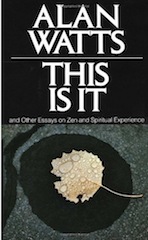 Excerpts from This Is It: and Other Essays on Zen and Spiritual Experience by Alan Watts.
Excerpts from This Is It: and Other Essays on Zen and Spiritual Experience by Alan Watts.
This — the immediate, everyday, and present experience— is IT, the entire and ultimate point for the existence of a universe. […] We use this simplest of words because we have no word for it.
The high ideals for which we are killing and regimenting each other are empty and abstract substitutes for the unheeded miracles that surround us— not only in the obvious wonders of nature but also in the overwhelmingly uncanny fact of mere existence.
Everything is as right as it can be. […] The universe, precisely as it is at this moment, as a whole and in every one of its parts, is so completely right as to need no explanation or justification beyond what it simply is.
It is usual for the individual to feel that the whole world has become his own body, and that whatever he is has not only become, but always has been, what everything else is.
The immediate now, whatever its nature, is the goal and fulfillment of all living.
The enlightenment or awakening is not the creation of a new state of affairs but the recognition of what always is.
Each thing, each event, each experience in its inescapable nowness and in all its own particular individuality was precisely what it should be, and so much so that it acquired a divine authority and originality.
Solving problems and coping with situations is by no means the only or even the chief business of life.
Nature is much more playful than purposeful, and the probability that it has no special goals for the future need not strike one as a defect.
The point of music is discovered in every moment of playing and listening to it. It is the same, I feel, with the greater part of our lives, and if we are unduly absorbed in improving them we may forget altogether to live them.
“Law of nonidentity” — “whatever you say a thing is, it isn’t.” […] (There is a world other than words) Words represent it, but if we want to know it directly we must do so by immediate sensory contact.
However much I may be impressed by the difference between a star and the dark space around it , I must not forget that I can see the two only in relation to each other, and that this relation is inseparable.
There are no such things as truths by themselves: a truth is always in relation to a point of view.
The price of intelligence as we now know it is chronic anxiety,
Imagine, a point of view, or perhaps a state of mind, which is experiential rather than intellectual— a kind of sensation rather than a set of ideas.
Let your mind alone ; let it think whatever it likes.
Thinker and thoughts are the same. […] When the dualism of thinker and thought disappears so does that of subject and object.
Man is not so much an organism in an environment as an organism-environment relationship.
Strictly speaking, there are no Zen masters because Zen has nothing to teach. […] the experience of awakening (satori) is not to be found by seeking,
One (can) not be right without also being wrong, because the two were as inseparable as back and front.
I believe that Zen appeals to many in the post-Christian West because it does not preach, moralize, and scold in the style of Hebrew-Christian prophetism.
Looking out into it at night, we make no comparisons between right and wrong stars, nor between well and badly arranged constellations. Stars are by nature big and little, bright and dim. Yet the whole thing is a splendor and a marvel which sometimes makes our flesh creep with awe.
In Zen one does not feel guilty about dying, or being afraid, or disliking the heat.
The Hebrew-Christian universe is one in which moral urgency, the anxiety to be right, embraces and penetrates everything.
The appeal of Zen, as of other forms of Eastern philosophy, is that it unveils behind the urgent realm of good and evil a vast region of oneself about which there need be no guilt or recrimination, where at last the self is indistinguishable from God.
Zen is above all the liberation of the mind from conventional thought.
“Fundamentally not one thing exists.” Things are terms, not entities. They exist in the abstract world of thought, but not in the concrete world of nature .
Ego is (a) persona or social role, a somewhat arbitrary selection of experiences with which he has been taught to identify himself.
The Way of Zen
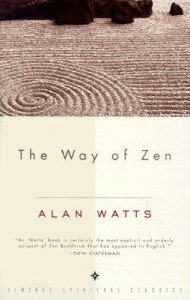 I have no other self than the totality of things of which I am aware.
I have no other self than the totality of things of which I am aware.
I have somehow become the empty space in which everything is happening.
TAO
The vague, void-seeming, and indefinable Tao is the intelligence which shapes the world with a skill beyond our understanding. … Whereas God produces the world by making, the Tao produces it by “not-making” (growing).
The Tao’s principle is spontaneity. But spontaneity is not by any means a blind, disorderly urge, a mere power of caprice. … A philosophy restricted to the alternatives of conventional language has no way of conceiving an intelligence which does not work according to plan, according to a (one-at-a-time) order of thought.
Hsuan – A metaphorical darkness; the sheer inconceivability which confronts the mind when it tries to remember a time before birth, or to penetrate its own depths.
If the ordinary man is one who has to walk by lifting his legs with his hands, the Taoist is one who has learned to let the legs walk by themselves.
The eye’s sensitivity to color is impaired by the fixed idea that there are just five true colors.
BUDDHISM
Reasonable men will always be capable of compromise, but men who have dehumanized themselves by becoming the blind worshipers of an idea or an ideal are fanatics whose devotion to abstractions make them enemies of life.
The value of emptiness lies in the the movements it permits or in the substance which it mediates and contains. But the emptiness must come first. This is why Indian philosophy concentrates on negation, on liberating the mind from concepts of Truth.
The basic reality of my life is not any conceivable object.
Maya: Things, facts, and events are delineated, not by nature, but by human description, and the way in which we describe (or divide) them is relative to our varying points of view.
–
The formal world becomes the real world in the moment when it is no longer clutched, in the moment when its changed fluidity is no longer resisted.
It is precisely (the) realization of the total elusiveness of the world which lies at the root of Buddhism.
SELF
Any attempt to conceive the Self, believe in the Self, or seek for the Self immediately thrusts it away.
It is fundamental to every school of Buddhism that there is no ego, no enduring entity which is the constant subject of our changing experiences. For the ego exists in an abstract sense alone, being an abstraction from memory. The past from which our ego is abstracted has entirely disappeared.
To one who has self-knowledge, there is no duality between himself and the external world.
(Zen on the Round of birth-and-death) The process of rebirth is from moment to moment, so that one is being reborn so long as one identifies himself with a continuing ego which reincarnates itself at each moment in time.
Nirvana can only arise unintentionally, spontaneously, when the impossibility of self-grasping has been thoroughly perceived.
Buddhism does not share the Western view that there is a moral law, enjoined by God or nature, which is man’s duty to obey.
Smriti (recollectedness) is a constant awareness or watching of one’s sensations, feelings, and thoughts – without purpose or comment. It is a total clarity and presence of mind, actively passive, wherein events come and go like reflections in a mirror: nothing is reflected except what is.
Through such awareness it is seen that the separation of the thinker from the thought, the knower from the known, the subject from the object, is purely abstract. There is not the mind on the one hand and its experiences on the other: there is just a process of experiencing in which there is nothing to be grasped, as an object, and no one, as a subject, to grasp it.
The object itself is just thought. A thought cannot see itself.
Dharmadhatu – The proper harmony of the universe is realized when each “thing-event” is allowed to be freely and spontaneously itself, without interference.
Logic and meaning, with its inherent duality, is a property of thought and language but not of the actual world.
As the sound “water” is not actually water, the classified world is not the real world.
Instead of trying to purify or empty the mind, one must simply let go of the mind – because the mind is nothing to be grasped. Letting go of the mind is also equivalent to letting go of the series of thoughts and impressions which come and go “in” the mind, neither repressing them, holding them, nor interfering with them.
PRINCIPLES AND PRACTICE
The fondest illusion of the human mind: in the course of time everything may be made better and better.
The power of thought enables us to construct symbols of things apart from the things themselves. This includes the ability to make a symbol, an idea of ourselves apart from ourselves. We learn to identify ourselves with our idea of ourselves.
All ideas of self-improvement and of becoming or getting something in the future relate solely to our abstract image of ourselves.
In Taoist and Buddhist thought there is no conception of a God who deliberately and consciously governs the universe. [The Tao, without doing anything leaves nothing undone]
It is part of the very genius of the human mind that it can, as it were, stand aside from life and reflect upon it, that it can be aware of its own existence, and that it can criticize its own processes.
When human beings think too carefully and minutely about an action to be taken, they cannot make up their minds in time to act.
From (such) memories, reflections, and symbols the mind constructs its idea of itself. … The identification of the mind with its own image is paralyzing because the image is fixed — it is past and finished.
The attempt to act and think about (an) action simultaneously is precisely the identification of the mind with its idea of itself.
Whatever we do, and whatever “happens” to us, is ultimately “right.”
To act “without second thought,” without double-mindedness, is by no means a mere precept of our imitation. For we cannot realize this kind of action until it is clear beyond any shadow of doubt that it is actually impossible to do anything else.
There is no necessity for the mind to try to let go of itself, or to try not to try.
“Brushing off thoughts which arise is just like washing off blood with blood.” – Japanese master Bankei
Social conditioning fosters the identification of the mind with a fixed idea of itself as the means of self-control, and as a result man thinks of himself as “I” – the ego. Thereupon the mental center of gravity shifts from the spontaneous or original mind to the ego image. Once this has happened, the very center of our psychic life is identified with the self-controlling mechanism.
As soon as I recognize that my voluntary and purposeful action happens spontaneously “by itself,” just like breathing, hearing, and feeling, I am no longer caught in the contradiction of trying to be spontaneous. There is no real contradiction, since “trying” is “spontaneity.”
One stops trying to be spontaneous by seeing that it is unnecessary to try, and then and there it can happen. … One does not realize the spontaneous life by depending on the repetition of thoughts or affirmation. One realizes it by seeing that no such devices are necessary.
Zen lies beyond the ethical standpoint, whose sanctions must be found, not in reality itself, but in the mutual agreement of human beings.
Zen does not confuse spirituality with thinking about God while one is peeling potatoes. Zen spirituality is just to peel the potatoes.
Zen is neither self nor Buddha to which one can cling, no good to gain and no evil to be avoided, no thoughts to be eradicated and no mind to be purified, nobody to perish and no soul to be saved.
The practice of Zen is not the true practice so long as it has an end in view, and when it has no end in view it is awakening — the aimless, self-sufficient life of the “eternal now.”
As muddy water is best cleared by leaving it alone, it could be argued that those who sit quietly and do nothing are making one of the best possible contributions to a world in turmoil.
To see the world as it is concretely, undivided by categories and abstractions, one must certainly look at it with a mind which is not thinking — which is to say, forming symbols about it. … A quiet awareness, without comment, of whatever happens to be here and now. This awareness is attended by the most vivid sensation of “nondifference” between oneself and the external world, between the mind and its contents — the various sounds, sights, and other impressions of the surrounding environment. … It just comes by itself when one is sitting and watching without any purpose in mind — even the purpose of getting rid of purpose.
The basic position of Zen is that it has nothing to say, nothing to teach. The truth of Buddhism is so self-evident, so obvious that it is, if anything, concealed by explaining it.
Awakening almost necessarily involves a sense of relief because it brings to an end the habitual psychological cramp of trying to grasp the mind with the mind, which in turn generates the ego with all its conflicts and defenses.
What we are, most substantially and fundamentally, will never be a distinct object of knowledge. Whatever we can know — life and death, light and darkness, solid and empty — will be the relative aspects of something as inconceivable as the color of space.
Awakening is to know what reality is not.
So long as one thinks about listening, one cannot hear clearly, and so long as one thinks about trying or not trying to let go of oneself, one cannot let go. Yet whether one thinks about listening or not, the ears are hearing just the same, and nothing can stop the sound from reaching them.
Because the world is not going anywhere there is no hurry. Hurry, and all that it involves, is fatal. For there is no goal to be attained.
The purposeful life has no content, no point. It hurries on and on, and misses everything. It is only when there is no goal and no rush that the human senses are fully open to receive the world. People in a hurry cannot feel.
Making an effort to concentrate on the instantaneous moment implies at once that there are other moments.
How the World Can Be the Way It Is
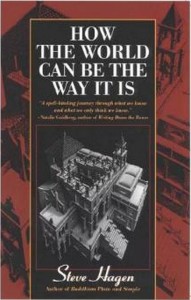 How the World Can Be the Way It Is: An Inquiry for the New Millennium into Science, Philosophy, and Perception Zen and Quantum Theory are really hard for me to wrap my head around, and Steve Hagen has big dollops of both in this book. I followed maybe 75 percent of the book. The stuff I highlighted won’t make much sense out of context but this is for my reference, so…
How the World Can Be the Way It Is: An Inquiry for the New Millennium into Science, Philosophy, and Perception Zen and Quantum Theory are really hard for me to wrap my head around, and Steve Hagen has big dollops of both in this book. I followed maybe 75 percent of the book. The stuff I highlighted won’t make much sense out of context but this is for my reference, so…
For it is sufficient, I think, to live by experience, and without subscribing to beliefs — Sextus Empiricus
(To believe, to hold an opinion) refers to a state of mind which we are powerless to choose.
His mind was changed because it was overwhelmed by a new awareness. In the moment in which he became aware of something new, his mind was different.
We must learn to rely solely on what we see rather than upon what we think.
We proselytize others because it makes us feel better. And the reason it makes us feel better is because we’re unsure of what we believe ourselves.
(Being fully awake is) Seeing without any mental bias — without concepts, beliefs, preconceptions, presumptions, or expectations.
You can’t choose to doubt.
We should always be prepared to take another look at what we believe and begin to doubt it. […] We should doubt until we no longer hold fast to any thing at all.
Whatever you think, is delusion.
“The world is not objectively real but depends on the mind of an observer.” — John von Neumann
The mind is what the brain does.
Apart from their functions, relationships, and components, we do not seem to know what things are at all. […] A thing receives its identity as much from what it is not as it does from what it is. […] When an object appears in the mind, we conceive it as a solitary thing unto itself. […] It is only as singular entities that our objects of consciousness can form in our mind. […] All things receive their identity as much from what they are not as from what they are. […] Spring can only be spring if we account for what it is not (e.g., summer) as an intrinsic part of its identity.
“How can one be ‘wrong’ about what one actually perceives?” — Roger Penrose
We simply have no direct experience of anything outside the mind. And to assume the existence (or, for that matter, he nonexistence) of anything outside the mind simply contradicts direct experience.
Three types of “recognition”
1) Naming a thing (labeling and categorizing. Purely conceptual)
2) What the thing does (function and utility)
3) Just seeing (pure perception, no conceptual overlay)
The more we learn about quantum physics, the more the universe appears like a thought rather than a thing. (Pointed out by Sir Arthur Edington)
Consciousness
It’s because we can easily conceive of (but never perceive) a time or place outside of our consciousness that we persist in holding this belief (that matter precedes consciousness) […] We never directly experience a time (or anything else) which precedes consciousness.
We don’t actually experience Consciousness Itself “originating” anywhere, or anywhen. Consciousness — the awareness that “something’s” happening — is ever-present and immediate. We never directly experience Nothing.
Consciousness (is) the originator, instead of the product, of place and time.
No one is ever conscious of not being (or not having been) conscious.
Consciousness is the conceiving (the making) of parts, or mind-objects, from the Whole. […] The “parts” — the physical and mental objects of consciousness, i.e., concepts — are merely appearances resulting from the working of Consciousness.
Consciousness splits the Whole, immediately creating an ego — an identity — which then sees all other things in opposition to it.
To gain information is merely to sink deeper into conceptual reality. […] We gain information at the expense of wisdom.
What you or I do right here, right now affects everything that ever was, is, or will be. Whatever you do is constantly affecting everything that has ever happened or will happen.
We “exist” not in being but in becoming — and in fading away.
We do not experience an I — we assume it. We only experience perception, thought, and consciousness.
Buddhism Without Beliefs
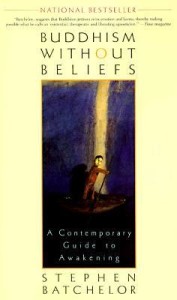 I’m not really sure what Stephen Batchelor is trying to say in Buddhism Without Beliefs. I think his main idea is there in the title. Excerpts below got some highlighter… real reviews at Amazon. This wasn’t one of my favorite books on the topic.
I’m not really sure what Stephen Batchelor is trying to say in Buddhism Without Beliefs. I think his main idea is there in the title. Excerpts below got some highlighter… real reviews at Amazon. This wasn’t one of my favorite books on the topic.
Awakening is no longer seen as something to attain in the distant future, for it is not a thing but a process — and this process is the path itself. […] It is an authentic way of being in the world.
The dharma is not something to believe in but something to do. [ Wikipedia: In Buddhism dharma means “cosmic law and order”, but is also applied to the teachings of the Buddha.]
An agnostic Buddhist is not a “believer” with claims to revealed information about supernatural or paranormal phenomena, and in this sense is not “religious.” […] The dharma is not a belief by which you will be miraculously saved. It is a method to be investigated and tried out. […] An agnostic Buddhist eschews atheism as much as theism, and is as reluctant to regard the universe as devoid of meaning as endowed with meaning.
Buddhism could be described as “the culture of awakening.”
Religions are united not be belief in God but by belief in life after death.
Regardless of what we believe, our actions will reverberate beyond our deaths. Irrespective of our personal survival, the legacy of our thoughts, words, and deeds will continue through the impressions we leave behind in the lives of those we have influenced or touched in any way.
Life is neither meaningful nor meaningless. Meaning and its absence are given to life by language and imagination.
Anguish emerges from craving for life to be other than it is.
Dharma practice is founded on resolve. […] An ongoing, heartfelt reflection on priorities, values and purpose. […] Dharma practice is the process of awakening itself: the thoughts, words, and deeds that weave the unfolding fabric of experience into a coherent whole.
The process of awakening is like walking on a footpath. When we find such a path after hours of struggling through undergrowth, we know at last that we are heading somewhere. Moreover, we suddenly find that we can move freely without obstruction. We settle into a rhythmic and easy pace. […] What counts is not so much the destination but the resolve to take the next step.
Focused awareness is difficult not because we are inept at some spiritual technology but because it threatens our sense of who we are.
The stiller the mind, the more palpable the dazzling torrent of life becomes.
The world is so saturated with the meanings given to it that those meanings seem to reside in the things themselves.
At every moment we are either inclining toward or engaged in an act: a physical movement, an utterance, a thought. Even when you decide not to act, you are still doing something: refraining.
As you sit in meditation, notice how what you are doing is the enactment of an earlier resolve. By attending to the details of this present moment, by choosing not to recollect the past or plan for the future, you are engaged in a process of creating yourself in a specific and deliberate way.
What are we but the story we keep repeating, editing, censoring, and embellishing in our heads? [I am] an unfolding narrative.
We cannot attain awakening for ourselves: we can only participate in the awakening of life.
When belief and opinion are suspended, the mind has nowhere to rest.
Meditation Now or Never
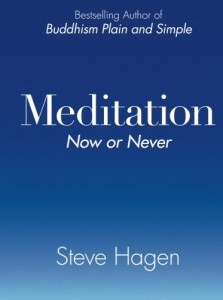 Publisher’s Weekly: Zen priest Hagen, author of Buddhism Plain and Simple and Buddhism Is Not What You Think, offers a brief and wonderfully accessible primer on meditation, which can be a surprisingly difficult practice for many beginners. He helpfully defines meditation via negativa: meditation is not a self-help program, a quick fix, a mind-training technique or a way to relax before jumping right back into the fray of our busy lives. It’s a lifelong practice that can, and should, seep into every arena of the quotidian, so that when we’re attentively folding laundry or taking out the trash, we’re doing meditation. It involves teaching the mind just to be here, says Hagen. Amazon.
Publisher’s Weekly: Zen priest Hagen, author of Buddhism Plain and Simple and Buddhism Is Not What You Think, offers a brief and wonderfully accessible primer on meditation, which can be a surprisingly difficult practice for many beginners. He helpfully defines meditation via negativa: meditation is not a self-help program, a quick fix, a mind-training technique or a way to relax before jumping right back into the fray of our busy lives. It’s a lifelong practice that can, and should, seep into every arena of the quotidian, so that when we’re attentively folding laundry or taking out the trash, we’re doing meditation. It involves teaching the mind just to be here, says Hagen. Amazon.
A few excerpts:
We live tuned in to ourselves, but tuned out from life.
We easily lose sight of the distinction between Reality and our ideas about Reality.
Meditation is an expression of faith in direct experience itself.
Meditation is useless. (Because) meditation is, finally, just to be here. Not over there, in some other place called peace or freedom or enlightenment. Not longing for something else. Not trying to be, or to acquire, something new or different. … We can’t do meditation for any reason other than to be aware. … If you’re sitting in meditation to get something — you’re not here.
Meditation is about deeply seeing what’s going on within your own mind.
In meditation, we see that there is no cosmic mystery to break through. … Reality and Truth don’t require any “figuring out.”
You can’t become enlightened (because) you’re already here, immersed in it. It’s like trying to become human.
The practice of meditation frees us from our insane desire to control ourselves and others.
If you can get past the resistance to meditation, nothing else in life will be an obstacle.
In each new moment we can live in either awareness or ignorance.
Our meditation practice reflects the attitude we take in life.
At the heart of meditation is the intention to be awake. (To experience) Reality as it is,before goals, ideas, or desires sprout. … Meditation is never a means to an end.
Meditation is not about doing anything. It is simply paying attention. … If our will is directed toward any object or purpose — even toward meditation correctly — then we’re not in meditation.
Meditation is continually returning to life so that we don’t miss it. There’s no gap, no distinction, between you and what you’re doing.
Instead of practicing now and here, we get lost in thought about it.
Enlightenment isn’t something we need to figure out. It’s just remembering — waking up to what you knew all along but were not paying attention to. There’s nothing to figure out. It’s only a matter of seeing and not talking to yourself.
Over time you’ll discover that meditation won’t give you ideas at all.
Meditation is a matter of zero or 100 percent. Either you’re present or you’re not. There are no in-betweens.
To the extent that we’re not fully present as we live our life, a good portion of our life passes away unlived.
Meditation is awareness.
The very distinction of “out there” and “in here” is just another mental construct. It isn’t Real.
The more present we are, the bigger the picture we see. The bigger picture we see, the more things seem to slow down. And when the Whole is seen, all is utterly still.
Almost everything we do is done for a purpose a result, an outcome. In meditation, however, we let go of hopes and fears, plans and outcomes, and simply come back to here and now.
The desire of one who is awake is simply to be awake.
We can ever really explain how we feel — we can only feel how we feel.
Waking up means, more than anything else, that we learn to see ourselves.
Meditation is about your attitude toward life.
We put together a world in our mind. We carry all kinds of ideas, beliefs, notions, and prejudices — and, for most of us, that is our reality. It’s where we live. We regularly confuse what we believe with what we actually know.
Everything in culture is built around the premise of going after something else.
We find awakening so elusive because we’re looking for it. And if we’re looking for it, that means we believe it’s not here.
There is no “out there.”
We need to awaken, again and again, in each new moment. And in each moment, we have a new opportunity to wake up.
Life is all at once. It’s forever now. It’s never “then.”
